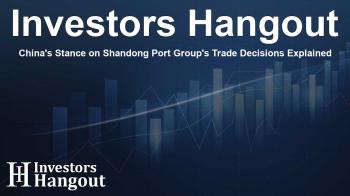China's Stance on Shandong Port Group's Trade Decisions Explained

China's Unawareness of Recent Shipping Ban Affecting Oil Imports
BEIJING - Recently, China's foreign ministry expressed a lack of awareness regarding Shandong Port Group's decision to bar U.S.-sanctioned ships from its services. This announcement underlines China's complex relationship with international trade and sanctions.
Significance of Shandong Port Group
The Shandong Port Group is responsible for managing critical terminals along China's east coast. This region serves as a primary entry point for oil shipments from countries such as Iran, Russia, and Venezuela. These nations supply nearly one-fifth of China's total oil imports, highlighting the strategic importance of this port.
Impact on Refiners and China’s Oil Import Strategy
Should the port enforce this ban, traders predict significant repercussions for independent refiners in Shandong. These refiners are major purchasers of discounted oil from the mentioned countries. Increased shipping costs may result, along with a potential decline in oil imports into China, affecting overall supply and pricing.
The Foreign Ministry's Response
A foreign ministry spokesperson assured that they were unaware of the Shandong Port Group's decision, which aligns with China's broader narrative on international sanctions. This response highlights the country's stance against U.S. policies.
China's Position on U.S. Sanctions
China's government has consistently voiced its opposition to what it terms illegal unilateral sanctions imposed by the United States. The spokesperson reiterated that China regards these actions as lacking a foundation in international law and as an infringement on sovereignty.
Broader Implications for International Trade
The situation around Shandong Port underscores the ongoing tensions between China and the United States regarding trade policies and sanctions. As oil prices continue to fluctuate globally, the actions of major stakeholders like the Shandong Port Group play a crucial role in shaping the market dynamics.
Potential Future Developments
As international trade evolves, the decisions made by entities like Shandong Port Group will likely continue to influence China's oil import strategies and relationships with sanctioned countries. Monitoring these developments is vital for understanding the future landscape of global energy trading.
Frequently Asked Questions
What is the significance of the Shandong Port Group?
The Shandong Port Group manages essential terminals that are key entry points for oil imports into China, particularly from countries like Iran, Russia, and Venezuela.
What could be the consequences of the ban on U.S.-sanctioned ships?
If enforced, the ban could increase shipping costs for independent refiners and might impede oil imports into China.
How has China's foreign ministry reacted to the shipping ban?
The foreign ministry claimed it was unaware of the ban, reiterating China’s opposition to U.S. sanctions.
Why does China oppose U.S. sanctions?
China views U.S. sanctions as illegal, lacking international law backing, and sees them as an infringement upon its sovereignty.
What are the broader implications of this situation?
The situation reflects ongoing trade tensions between China and the United States and highlights how such sanctions can disrupt global energy markets.
About Investors Hangout
Investors Hangout is a leading online stock forum for financial discussion and learning, offering a wide range of free tools and resources. It draws in traders of all levels, who exchange market knowledge, investigate trading tactics, and keep an eye on industry developments in real time. Featuring financial articles, stock message boards, quotes, charts, company profiles, and live news updates. Through cooperative learning and a wealth of informational resources, it helps users from novices creating their first portfolios to experts honing their techniques. Join Investors Hangout today: https://investorshangout.com/
Disclaimer: The content of this article is solely for general informational purposes only; it does not represent legal, financial, or investment advice. Investors Hangout does not offer financial advice; the author is not a licensed financial advisor. Consult a qualified advisor before making any financial or investment decisions based on this article. The author's interpretation of publicly available data presented here; as a result, they should not be taken as advice to purchase, sell, or hold any securities mentioned or any other investments. If any of the material offered here is inaccurate, please contact us for corrections.
